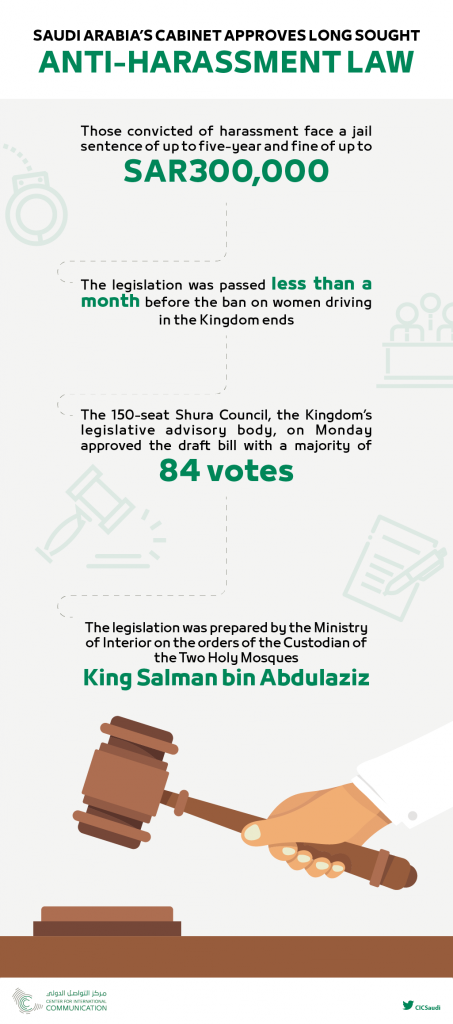Saudi Arabia’s Council of Ministers has passed a long sought anti-harassment law, which carries a maximum penalty of up to five years in prison and a fine of up to SAR300,000.
The Council of Ministers, which met in the port City of Jeddah, swiftly passed the law only a day after the 150-seat Shura Council, the Kingdom’s legislative advisory body, approved the draft bill with a majority of 84 votes. The legislation was prepared by the Ministry of Interior on the orders of the Custodian of the Two Holy Mosques King Salman bin Abdulaziz, who heads the Council of Ministers.
“After reviewing the comments of His Royal Highness the Minister of Interior, and after considering the Shura Council Resolution No. (163/40) dated 13/9/1439 H (May 28, 2018), the Council of Ministers decided to approve the system to combat the crime of harassment,” the official Cabinet statement. “A royal decree has been prepared.”
The draft legislation was passed by the Shura Council less than a month before the Kingdom lifts the ban on women driving. King Salman made the historic decision in September 2017 to allow women to drive from June 24. The decision is in line with the Vision 2030 blueprint for the future, spearheaded by Crown Prince Mohammed bin Salman.
The legislation consists of eight articles and “aims at combating the crime of harassment, preventing it, applying punishment against perpetrators and protecting the victims in order to safeguard the individual’s privacy, dignity and personal freedom which are guaranteed by Islamic law and regulations,” according to a Shura Council statement.
King Salman ordered the Ministry of Interior to prepare the anti-harassment bill in light of the negative impact of harassment on the individual, family and society. Harassment also violates Islamic values. In order to combat the social phenomenon of harassment, it was deemed necessary to enact a law that criminalises such behaviour and spells out its legal consequences.
The anti-harassment legislations “is a very important addition to the history of regulations in the Kingdom,” Shura Council member, Dr. Latifa Al Shaalan, said. “It fills a large legislative vacuum, and it is a deterrent system when compared with a number of similar laws in other countries.”
A clear definition of what constitutes harassment will help the Public Prosecutor investigate complaints and present suitable punishment for those convicted.
In addition to mandating a prison term of up to five years and a fine of up to SAR300,000, the bill also doubles the potential penalties for several other factors, including multiple occurrences of the harassment; occurrence of the crime in the workplace, place of study or care home or shelter; or if he perpetrator occupying a position of authority vis-a-vis the victim. Other factors are if the victim was unconscious; the offence was being committed at a time of crisis, accident or disaster; or if the crime was against a child or person with special needs.
Calling the new law a ‘qualitative leap’ in the fight against sexual harassment, leading lawyer Dimah Alsharif told Arab News that the end of the driving ban focused attention on the issue of potential harassment. The new law will help by “imposing clear and specific clauses directly related to driving and to ensuring people’s freedom to practice this right.”

(Source: Center for International Communication)














